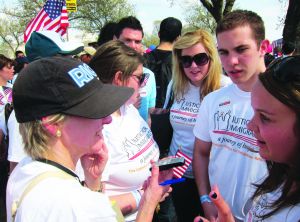
Hundreds of thousands of people converged at the National Mall in Washington D.C. on Sunday, March 21 in support of comprehensive immigration reform.
Demonstrators of all nationalities raised the flags of their countries of birth alongside the American flag in a crowd that stretched for blocks. The “March For America” rally was the largest since 2006 after immigration reform legislation was shot down in 2007.
14 Cabrini students and faculty members were among those thousands. Students from Bryn Mawr College, Eastern University and Villanova University as well as other organizations from the area were also present.
Katy Friggle-Norton prepared two buses to transport these groups from Villanova University. Norton is an active congregant at Central Baptist Church in Wayne.
“This is the biggest rally on the mall since Obama has become president,” Norton said to the group.
Speakers at the rally included Cardinal Roger Mahony from Los Angeles and Jesse Jackson. President Obama also made remarks through a prerecorded videotaped message voicing his support to the crowd.
Students were motivated to attend the rally for a number of different reasons. Monica Burke, senior English and communication and biology major, believes the current system is broken and wanted to show her support for an overhaul of immigration legislation.
“Without fixing the laws that are ineffective, immigration problems can’t be solved,” Burke said. “The current laws make it impossible for the number of people who want to come to America to do so legally.”
Those that marched held by signs that read, “Equal treatment for all” and “No human can be illegal” at the rally.
Frances Garret, sophomore social work and Spanish major at Eastern University, was uplifted by the sheer number of people at the rally.
“It was really powerful to be in the midst of so many people that want change and have traveled so far to stand up for their rights,” Garrett said.
The Latino community from West Chester was also in attendance alongside Cabrini students. Sr. Mimi DePaul, coordinator of Hispanic ministry of St. Agnes Church, wanted to raise her voice for the undocumented.
“There’s been a large Hispanic presence [in the congregation] since 1968,” DePaul said. “80 percent are Mexican, 10 percent are Puerto Rican, and 10 percent are from Latin America.”
DePaul also recognized the reason why immigrants are leaving their countries of birth.
“They’re fleeing from hunger. I believe if they could, the Mexicans want to stay in Mexico. They’re making one tenth in Mexico of what they make here.”
By the end of the day, DePaul not only was confident that she had made a difference but was overwhelmed by the positive energy at the rally.
“There was no fear here. It just seemed to be a really family-friendly atmosphere,” DePaul said. “I’m hoping I can contribute and encourage people I work with to do their best to get this reform passed.”
People from across the country represented a range of ethnic minorities. Michael Byun, executive director of Asian services, has seen many families displaced due to current immigration laws. His own family immigrated to the United States in 1975.
“We believe in humane immigration reform that works towards a path to legalization,” Byun said. “We have lots of family members separated because of the current system.”
Julie, who requested her last name not be used due to her undocumented status, shared her personal story. Growing up in Mexico City, her mother was involved in an abusive relationship with her husband and wanted a better life for her children.
“I actually came from Mexico when I was 12. I didn’t decide to, it was mainly my mom,” Julie said.
She settled in Austin, Texas, with a visa and excelled in her academics as an honors student and received letters of acceptance from Yale University. After receiving her bachelor and masters degree in nursing in America, her visa expired.
“I can’t work because of my undocumented status even though I have a masters in a profession that is highly needed in this country,” Julie said.
While she wants to be a legal citizen of the United States, she expressed her frustration with the current system and the inability to change her status.
“There is no way to get behind a line,” Julie said. “There is no way to fix it unless you are deported.”
When asked if she wanted to return to Mexico, Julie noted how different the cultures are between Mexico and the United States.
“The families I visit say I’m too Americanized,” Julie said.
Because of this rally, Julie and millions of other undocumented immigrants saw a ray of hope.
“I call my home the United States. I call my home Austin, Texas,” Julie said.


